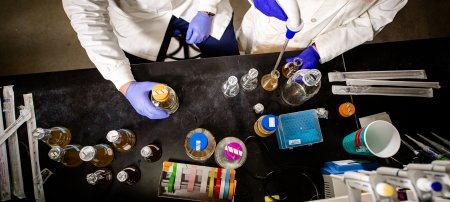Individual economies and corporations can talk about output, resources, and profits, but all of us must deal with the results of production-based economies. From raw materials to final products, pollution is a consequence the market does little to manage, and it’s something William Breffle, associate professor of natural resource economics at Michigan Tech, would like to see change.
From April through December, freighters glide along the Lake Superior horizon off the coast of the Keweenaw Peninsula, carrying raw materials to and fro, forming their own kind of economic indicator. These materials—everything from taconite pellets and lumber to copper, salt, and goods from across the world—turn into cars and paper and pipes and a thousand other products.
While the market is excellent at balancing supply and demand, William Breffle, associate professor of natural resource economics in the School of Business and Economics, points out that the market handles pollution poorly. In a conversation with CBS Detroit’s Matt Roush, he recounted, “We’re going to have to start treating our waste stream as a necessary but negative side effect of production if we’re going to have long term sustainability of economic services that benefit people.”
“It seems as though we don’t care about future generations when it comes to our debt and climate modification”
As much hype as there has been about an information economy, we still survive thanks in large part to old economic processes of production and consumption of physical goods. These raw materials come from somewhere, and the byproducts of their consumption, and the waste from the end of their lifecycle, all goes somewhere, too.
Pollution, along with all of the other unwanted byproducts of our economic engines, is generally not accounted for in current market models. Despite his belief in conservative market principles, Breffle feels we need to be aware of these effects and finds them to be the right place to intervene in the market.
“It seems as though we don’t care about future generations when it comes to our debt and climate modification,” he says. “And it becomes a moral issue because the people aren’t even here yet to express their preferences for a clean environment. They aren’t here to vote, and federal and state governments enact regulations and conduct policy in ways that are too myopic to benefit the future as much as they should.”
While extraction industries continue to transform our economy—we see this in everything from the price of minerals making mining more attractive to the huge increase in supply of natural gas provided by the controversial process called fracking—we will continue to see the question of harmful environmental and social consequences. The question for economists is how to account for these byproducts in the market and reward behavior that takes the long view of the health of future generations into account, the ones who are not yet here to speak.
Michigan Technological University is an R1 public research university founded in 1885 in Houghton, and is home to nearly 7,500 students from more than 60 countries around the world. Consistently ranked among the best universities in the country for return on investment, Michigan's flagship technological university offers more than 185 undergraduate and graduate degree programs in science and technology, engineering, computing, forestry, business, health professions, humanities, mathematics, social sciences, and the arts. The rural campus is situated just miles from Lake Superior in Michigan's Upper Peninsula, offering year-round opportunities for outdoor adventure.




